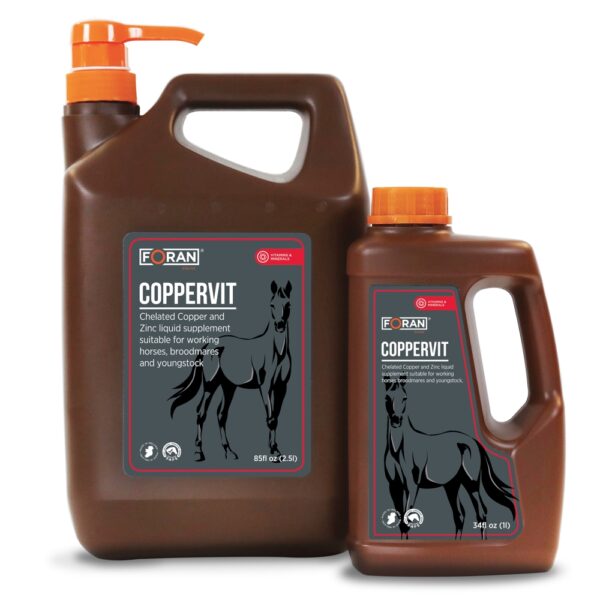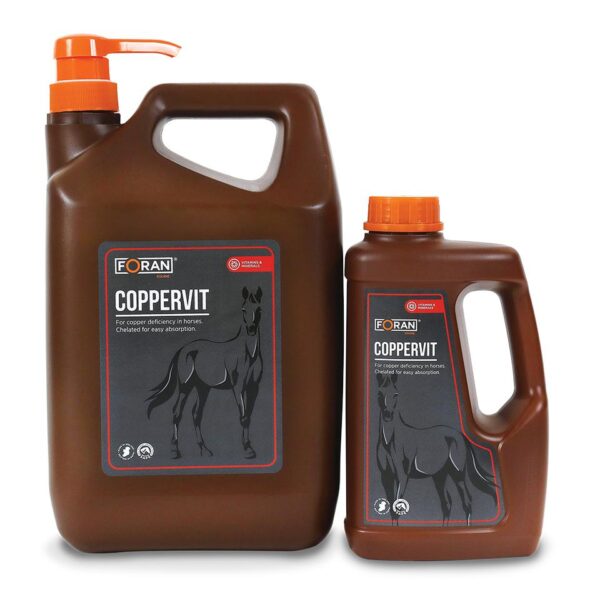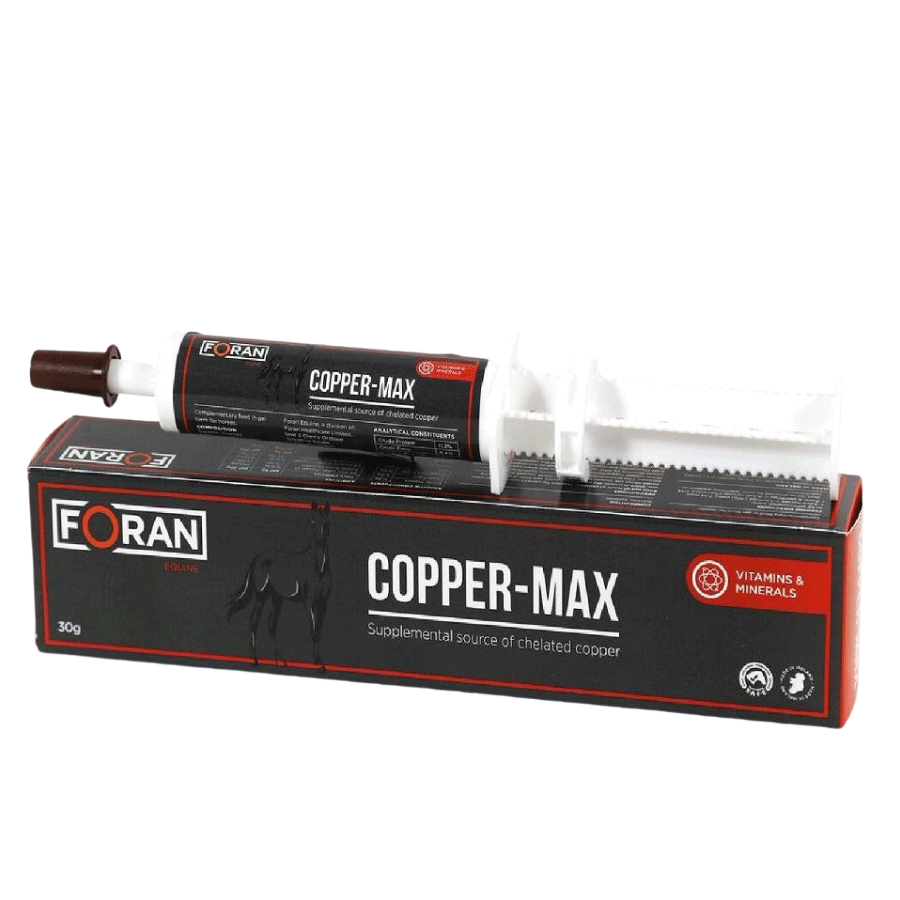Coppervit
Chelated minerals, antioxidant and B Vitamins combined to support growth and development
View ProductCopper is a trace element essential for various vital functions in the body. While it may not be commonly associated with a horse’s diet, its significance should not be underestimated. It is often poor in the Middle Eastern soils and in their forage as a result so this deficiency must be accounted for, Copper plays a crucial role in several physiological processes in horses:
Energy Production: Copper is involved in energy production through its association with the enzyme cytochrome c oxidase. This enzyme is essential for the production of adenosine triphosphate (ATP), which is the primary energy currency of the body. A deficiency in copper in horses can potentially lead to reduced energy production, which may affect the horse’s athletic performance, especially when combined with issues related to iron metabolism.
Red Blood Cell Health and Iron Metabolism: Contrary to popular belief, anaemia in horses is not solely caused by iron deficiency. Anaemia is characterized by a deficiency in the number and quality of red blood cells in the body. While iron is generally abundant in most horse diets, copper is critical for red blood cell health. Copper-dependent enzymes known as “ferroxidases” are responsible for mobilizing iron stores from the liver, bone marrow, and spleen. If there is a deficiency of copper, it can impact iron mobilization, leading to impaired red blood cell function. This, in turn, can have significant consequences on the horse’s overall health and performance.
Connective Tissue Formation: Copper is also essential for the formation of connective tissues in the body. Connective tissues are crucial for maintaining the structural integrity of various body parts, including muscles, tendons, and ligaments. A deficiency in copper in horses could potentially compromise the horse’s musculoskeletal health.
Melanin Formation: Copper is involved in the formation of melanin, the pigment responsible for skin, hair, and eye colour in horses. Adequate copper levels are necessary to maintain normal pigmentation.
Immune System Support: Copper acts as an antioxidant, helping to protect cells and tissues in the body from harmful reactive oxygen species. This antioxidant function contributes to the overall health of the immune system.
In summary, copper is a trace element with a wide range of essential functions in a horse’s body. It is involved in energy production, red blood cell health, connective tissue formation, pigmentation, and immune system support. Copper deficiencies can have detrimental effects on a horse’s health and performance, making it crucial to ensure that horses receive an adequate supply of copper in their diets.


Copper plays a pivotal role in keratin production, significantly influencing the quality of a horse’s coat and hooves. When a copper deficiency in horses occurs, it can manifest as a brittle mane and tail, alongside persistent hoof issues like poor horn growth and cracks. Additionally, copper-dependent enzyme polyphenol oxidase aids in converting tyrosine to melanin, the pigment responsible for skin and coat colour. A deficiency in copper may result in a faded or bleached appearance of your horse’s coat colour.
Fertility: Copper is vital for fertility, and a deficiency has been linked to issues such as foetal death, resorption, delayed oestrus, and abortion. While many studies on this subject have focused on other species like sheep and cattle, its relevance in horses should not be underestimated.
Causes of Copper Deficiency in Horses: Several factors can contribute to a copper deficiency in your horse:
– Insufficient Dietary Intake: This can occur due to factors like providing poor-quality hard feed that diminishes nutrient digestibility and absorption, offering feed with copper levels below recommended guidelines, following a forage-only diet (as forages are often low in copper), or underestimating the demand for copper, especially in young horses or Arabian show horses, racehorses, endurance horses or those with a high intensity training schedule.
– Mineral Imbalance: The dietary intake of iron, zinc, and sulphur can potentially hinder copper absorption in the small intestine. While molybdenum is known to tie up copper in other species, its effects in horses are less understood. It’s essential to note that under these conditions, a deficiency may still occur even with adequate copper intake.


Recognizing Copper Deficiency: Identifying a copper deficiency in horses involves looking for common signs, which we have already discussed. To summarize, these signs include:
– Poor performance
– Skeletal development issues
– Faded coat colour
– Poor coat and hoof quality
For an accurate diagnosis, your veterinarian may perform tests like blood, hair, or liver tissue analysis. While blood and hair tests can sometimes yield unreliable or misinterpreted results, a liver biopsy can provide a more precise assessment of copper status. However, liver biopsies are typically reserved for extreme cases, often involving liver disease.
Correcting Copper Deficiency in horses: Fortunately, addressing a copper deficiency in horses is relatively straightforward. The choice of the best copper supplement for horses depends on individual needs:
– Copper supplements come in various forms, including liquids, pastes, or powders, and can be administered daily or as needed.
– Copper chelates, where copper is attached, usually to an amino acid or glucose molecule, enhance bioavailability. These are particularly useful for managing mineral imbalances, where iron or other minerals may inhibit absorption.
– For instance, Foran Equine CopperVit is a daily chelated copper supplement for horses that also contains manganese, vitamin E, and vitamin B12. It’s suitable for horses fed daily, such as pregnant mares or growing youngstock.
– Another option is Foran Equine Copper-Max, which contains chelated copper and a balanced level of zinc. This paste supplement, available in single-use syringes, is designed to support all horses requiring additional copper, especially those undergoing strenuous training.

Horses fed traditionally in the Middle East, those on hay-only diets or those not receiving supplementary feed are at risk of copper deficiency, along with other essential trace minerals. Correcting this deficiency may involve providing a suitable hard feed or a broad-spectrum vitamin and mineral supplement. Additionally, using Copper Max can be beneficial, with the frequency of use determined by the extent of the horse’s copper deficiency, typically involving two to three syringes given 10-14 days apart, followed by ongoing assessments to determine future supplementation needs.

Chelated minerals, antioxidant and B Vitamins combined to support growth and development
View Product

Group Commercial Manager GCC Region
Based in the UAE, Nicolas Gaumerais is the Commercial Manager of the Connolly's RED MILLS Group which includes Foran Equine supplements and Connolly's RED MILLS horse feed in the GCC region. Nicholas regularly travels across the Gulf.